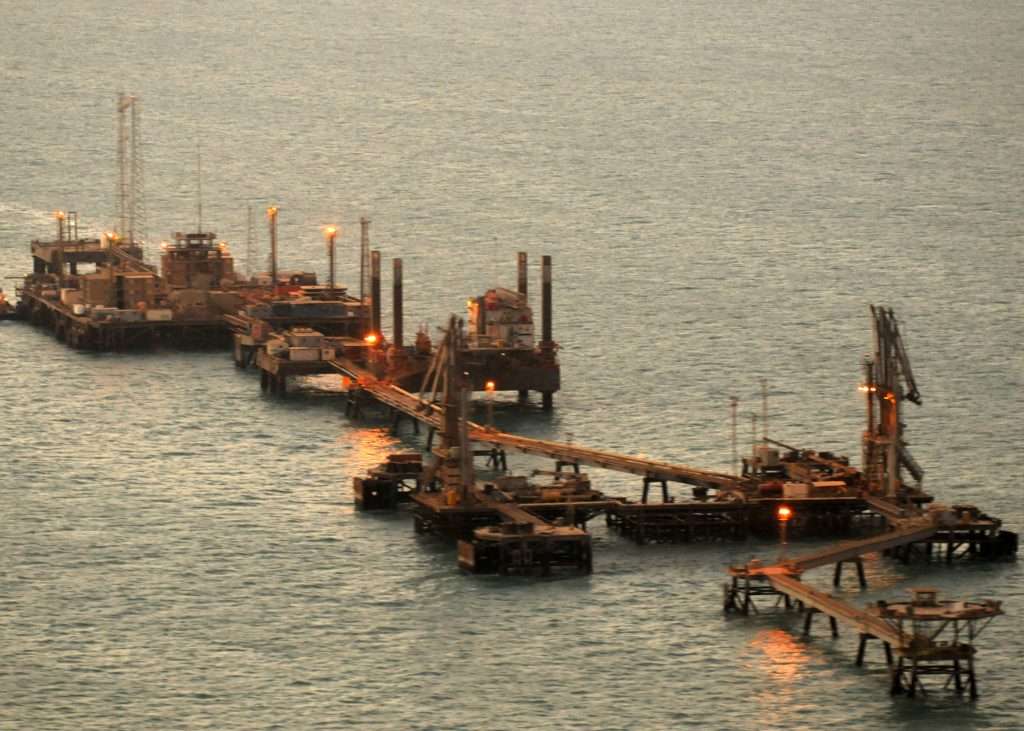Iraq turns to Turkey for power stations amid electricity crisis

Iraq’s Khawr Al Amaya Oil Platform near Umm Qasr Port, Basra, Iraq
Iraq has turned to Turkey to fill its chronic electricity shortages by hiring floating power stations from a Turkish energy company, as reported by The National on August 25th.
Iraq has sealed an emergency deal with Turkey’s Karpowership company to hire two ships, commonly called “powerships” or power barges. These ships are stationed off the coast of Iraq’s province of Basra. These massive ships, essentially operate as mobile power plants and can can reportedly generate as much as 590 megawatts.
Powerships are one of the new fixes that Iraq has used from Turkey to solve its power issue. Iraq has increased its imports of electricity from Turkey by twofold, raising the electricity supply from 300 to 600 Megawatts (MW). This quick-fix has especially benefitted the northern provinces of Nineveh, Kirkuk and Salahaddin.
The first power barge, the Karadeniz Orhan Ali Khan, was docked at Umm Qasr Port on August 21st, according to Iraq’s Minister of Electricity, Ziad Ali Fabel. The Minister said that the vessel has a generation capacity of 125 MW and is expected to be operational in the coming days. He added that Iraq plans to boost output from the ships to 1,500 MW in the coming years, in a bid to to meet demands and stabilise the supply in Basra. A second ship, the Orka Sultan, arrived on August 23rd and docked at Khor Ali Zubair port. Iraq’s Ministry of Transportation referred to the Okra Sultan as the “longest ship” to go to Khor Al Zubair port.
Karpowership said in a statement that these multi-fuel ships will run for a preliminary period of 71 days and will “play a critical role in stabilising the national grid and meeting demand.”
The Turkish company owns and a fleet of powerships, supplying countries that lack the time or resources to build enough permanent onshore capacity. Its ships are stationed worldwide in countries such as Ghana, Gabon and Brazil.
Meanwhile, Iraq is likely to rely on these floating powerships for the years ahead, given the country’s chronic electricity crisis. This crisis runs deep in Iraq’s recent history, from heavy energy infrastructure damage during the 1991 Gulf War which was worsened by the new government’s mismanagement and corruption following the 2003 US-led invasion. Back in 2020, former prime minister Mustafa Al Kadhimi estimated that the amount of money invested on the electricity sector since 2003 is around $60 billion.
In 2024, Iraq’s power capacity reached around 27,000MW, but summer demand often tops 45,000MW. The shortfall has widened in 2025 after Iran halved natural gas exports to cover its own needs, knocking nearly 4,000MW off Iraq’s grid in July. The crisis deepened further with Washington’s “maximum pressure” campaign against Tehran. In March, the US refused to reinstate a waiver that allowed Iraq to import 500 MW of electricity daily from Iran. The US has continued to accuse Iran of smuggling crude oil through Iraq and is weighing the possibility of sanctioning Iraq’s state-owned Oil Marketing Company.
Iraq is OPEC’s second-largest oil exporter, but Iraq is dependent on Iran for about a third of its electricity needs. It imports 50 million cubic metres of natural gas from its neighbour, a trade not covered by sanctions.
This prolonged crisis has led to rolling power blackouts during the peak summer heat, with temperatures soaring above 50°C in the southern provinces. Public anger has spilled into protests, echoing the unrest of 2018 and 2021 over electricity shortages and failing basic services. The heatwave is particularly felt in the south, with women and farmers reliant on water buffaloes being hit hard the most.
Iraq is attempting to improve its energy infrastructure with regional and international collaboration, such as from the World Bank. In April, Iraq signed agreements with major US companies like GE Vernova and UGT Renewables for energy production. Iraq also signed a deal with Chevron for oil exploration in the Nasiriyah oilfield, an agreement which is meant to increase the country’s crude oil capacity.
Iraq has also secured a multi-billion-dollar integrated energy project with TotalEnergies and another agreement with Germany’s Siemens Energy.
Additionally, the country is pursuing regional power ties with Jordan, the Gulf Cooperation Council, and Turkey, while aiming to add 7,000 MW of renewable energy by 2030.
The National, Maghrebi.org
Want to chase the pulse of North Africa?
Subscribe to receive our FREE weekly PDF magazine














